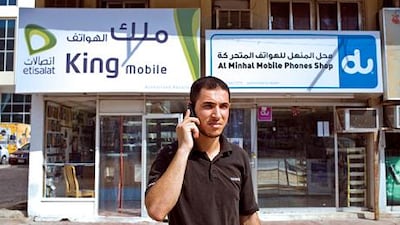Incompatibilities between broadcast systems run by Etisalat and du are behind a delay in the operators selling television packages across the Emirates, says a senior telecommunications executive.
Editor's Pick: The big business stories making headlines today
Al Jazeera leader quits after 8 years Wadah Khanfar is to quit his position as director general of Al Jazeera, departing on a high note following the network's acclaimed coverage of the Arab Spring. read article
Boost and warning for airlines from Iata Middle East airlines are expected to make $800 million this year, up from a forecast of $100 million three months ago. Read article
Gulf states press ahead with plans for rail networks Governments in the region are pushing ahead with rail link projects to transport passengers and boost trade. Read article
The telecoms companies are restricted to offering fixed-line services in certain areas of the UAE.
But under long-delayed plans, customers will be able to choose between operators by the end of this year.
That will extend to voice and broadband packages - but liberalisation of internet protocol television (IPTV) will be further delayed.
"When infrastructure sharing comes, it is most likely that it will cover voice and broadband, and that TV will come at a later stage," said Osman Sultan, the chief executive of du.
The delay is attributable to "technical reasons of interoperability".
While telecoms companies' revenues from television may be "marginal", TV is important because telecoms operators sell internet, landline and TV services as one package, Mr Sultan said.
Any delay in launching a nationwide IPTV service could impede the two operators' contest for customers.
"We do not want to see this situation lasting long," said Mr Sultan. "Interoperability in the infrastructure is good. You should be able to switch easily."
He was speaking on the sidelines of a conference in Dubai on IPTV standards.

